

New York City‘s Little Ukraine has been the beating heart of the city’s Ukrainian population since the mid-twentieth century. Beginning with an influx of Ukrainian immigrants as a result of World War II, roughly 150,000 Ukrainians call NYC home today. The Ukrainian Village (or as some call it, Little Ukraine) is a small subsection of the East Village, more or less spanning the area between 1st and 3rd Avenue and 6th and 7th Street.
The community there boasts a vibrant cultural food scene and many institutions that support Ukrainians. While Little Ukraine has sadly seen a decreasing population due to the gentrification of the neighborhood and fewer Ukrainian immigrants than there were following WWII, there is still plenty of cultural beauty to discover in this little piece of Manhattan.
Food
1. Veselka
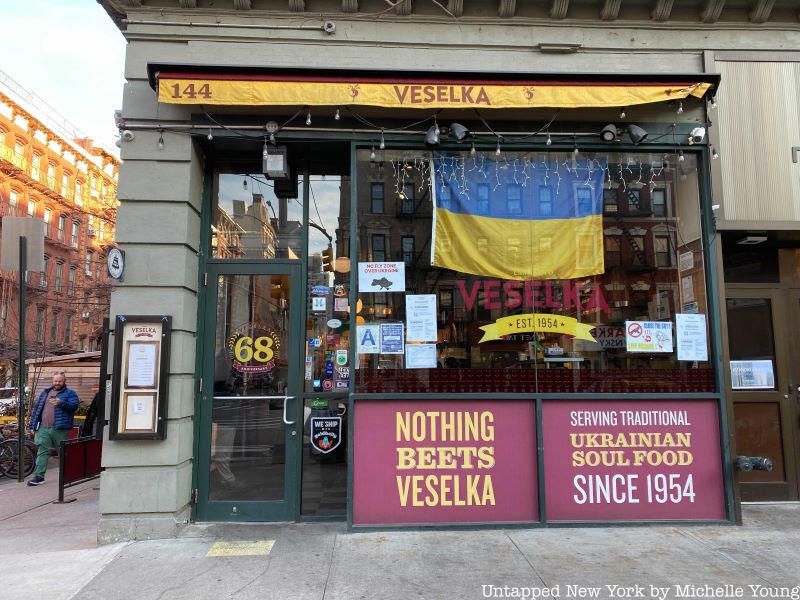
The Ukrainian Village has no shortage of fantastic cultural fare, and perhaps its most popular spot is Veselka at 144 2nd Ave. Veselka has been serving authentic Ukrainian cuisine to New Yorkers since 1954, with a variety of classics including pierogi, beef stroganoff, and goulash. During the first year of the war in Ukraine, Veselka donated 100% of the profit from sales of its infamous borscht and raised $350,000 for Ukrainian relief efforts. It is now offering a new alternative with its “Stand with Ukraine Bowl, ” which comes with two potato, two meat, and two sauerkraut and mushroom pierogis topped with chopped bacon, grilled kielbasa, and caramelized onions. All proceeds will once again be donated. Check Veselka out not only to try its delicious food but also to support the bigger cause for the Ukrainian community.
2. Streecha
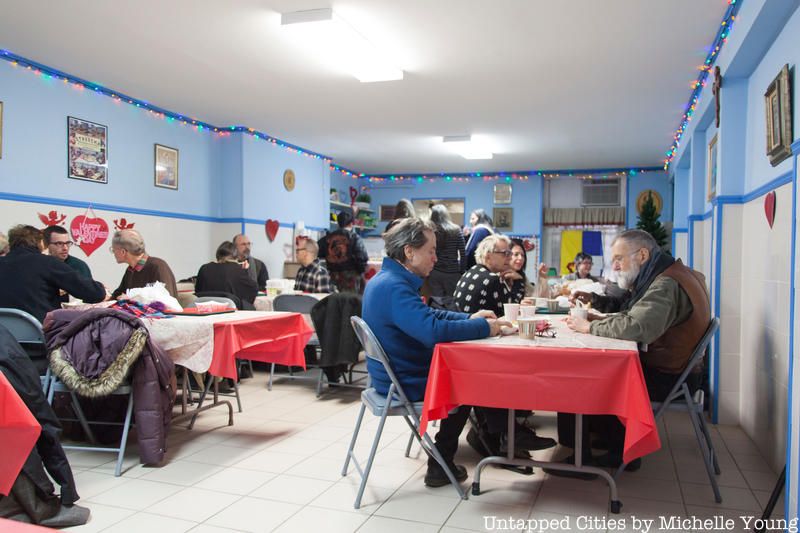
Another stand-out option for Ukrainian dining in the East Village is Streecha. Located basement-level at 33 E 7th Street, Streecha is a relatively new restaurant that serves traditional Ukrainian dishes without any unnecessary flair. Seemingly an unassuming small room with traditional decorations on the walls and simplistic tablecloths, this joint serves top-tier food at an affordable price. Streecha even lets anyone interested learn more about the making of their tasty food by letting volunteers help fold the varenyky on Saturdays between 8 AM and 11 AM.
3. Ukrainian East Village Restaurant Inside the Ukrainian National Home
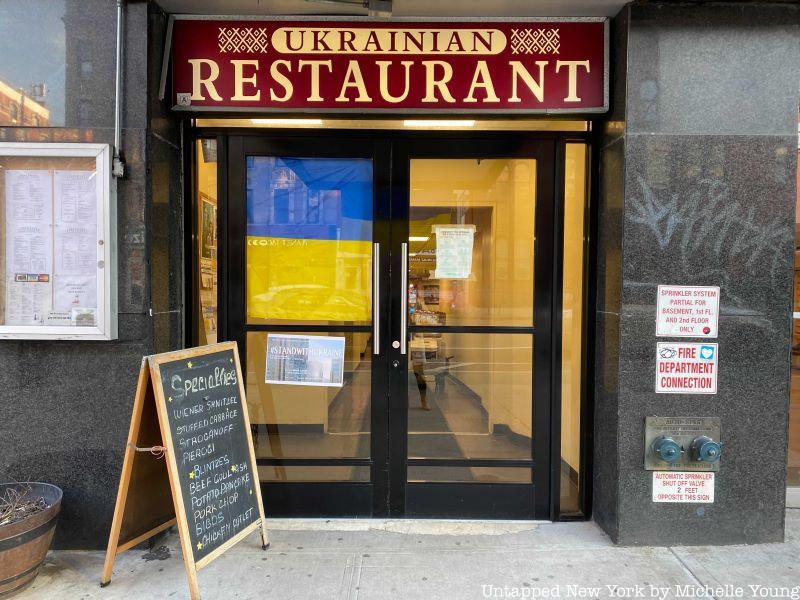
Tucked deep inside the Ukrainian National Home at 140 2nd Ave is the Ukrainian East Village Restaurant. With intricate Ukrainian decorations adorning the walls and vibe-setting mood lighting, this restaurant is a Ukrainian Village staple. The Ukrainian East Village’s menu is full of classics like potato pancakes, herring in wine sauce, and stuffed cabbage. Although the restaurant has a peculiar location, it’s a hidden gem of Little Ukraine and has been serving the neighborhood for over fifty years. It’s a favorite of many locals, so next time you’re in the area check it out!
4. KGB Bar
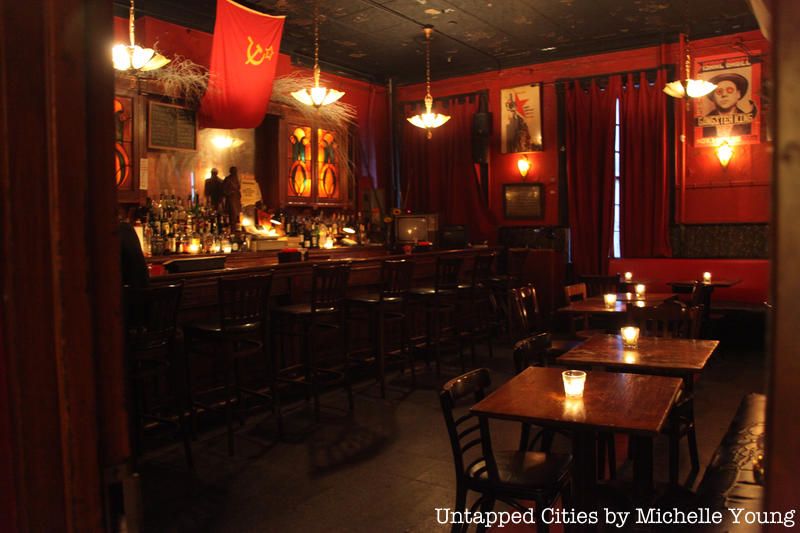
The KGB Bar is a Soviet-themed bar that serves Ukrainian beer and liquor over Russian alternatives as a show of support for Ukraine. The building the bar is located in was once a private social club for Ukrainian Socialists, and when the bar opened in 1993 it used the Soviet-era memorabilia left behind to act as inspiration for the new bar. While the KGB Bar has a long history of supporting Ukrainians, it is also a revered literary haunt in NYC. The mysterious bar hosts readings multiple times a week, with performances of anything from poetry to fiction. It is also well-known for having cheap drinks and free admission. In other words, there is nothing holding visitors back from checking out KGB Bar and supporting the local Ukrainian community.
Cultural Stops
5. Ukrainian Museum
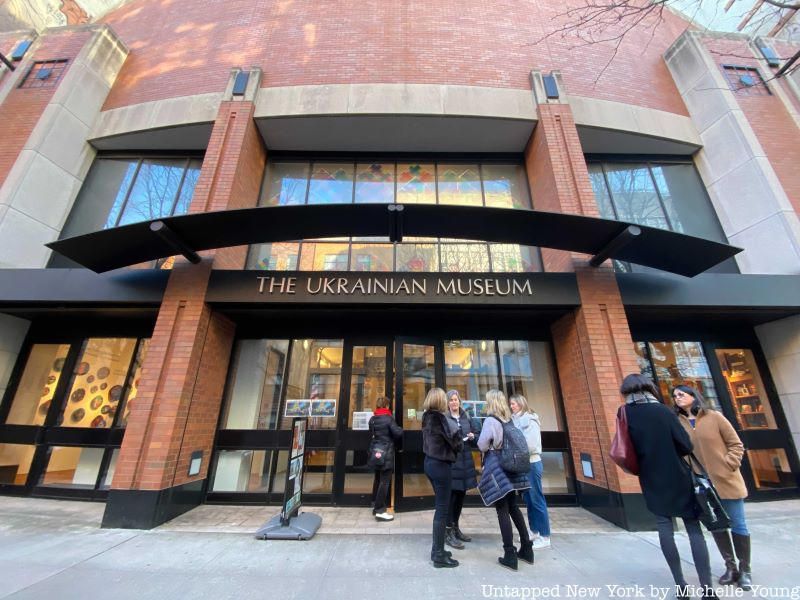
Sitting at 222 E 6th Street is the Ukrainian Museum, considered the largest American museum dedicated to the cultural heritage of the Ukrainian people. With a massive collection of Ukrainian folk art including jewelry, ceramics, metalwork, paintings, clothing, and “pysanky” (better known here as Ukrainian easter eggs), the Ukrainian museum is an unmissable part of the Village. The museum also includes an impressive archive section that documents the immigration of Ukrainians to the United States through Ellis Island in photographs. Additionally, the museum currently holds events and demonstrations to raise awareness of the ongoing conflict in Ukraine. General admission is just $8, a small price to pay to dive deeper into Ukrainian tradition, religion, and cultural importance.
6. Arka
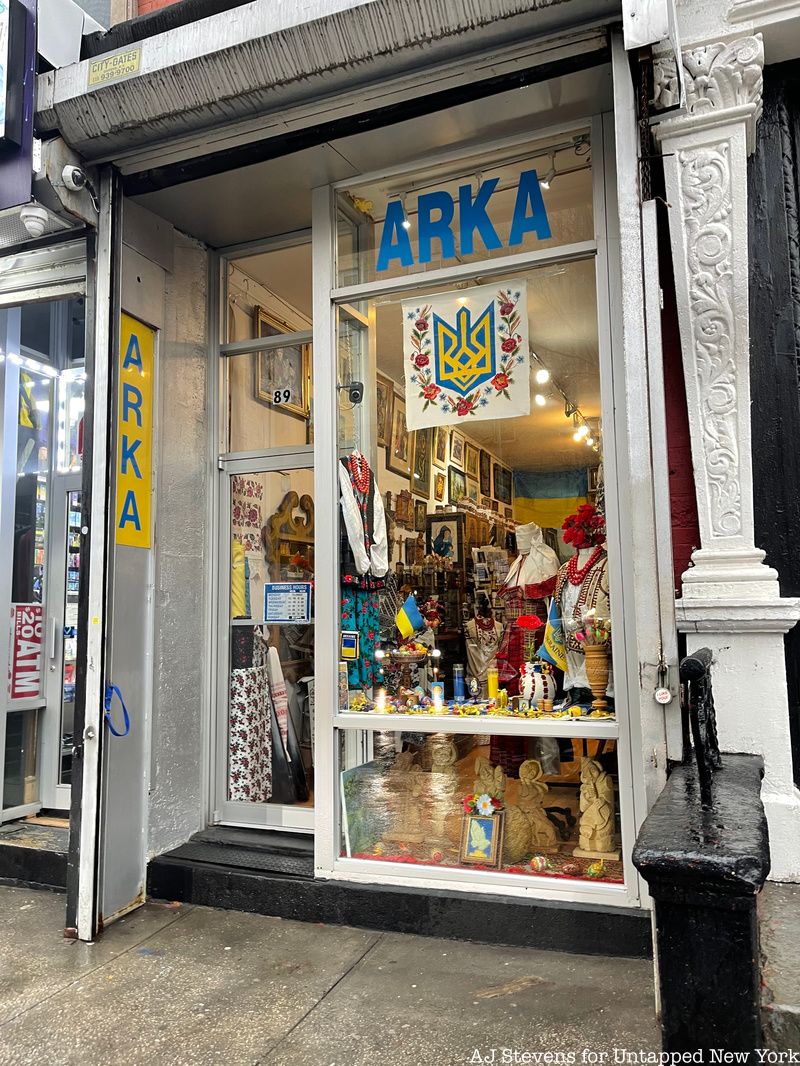
Opened in 1951 by Ukrainian immigrants, Arka is currently one of the sole remaining stores in New York City for purchasing traditional Ukrainian clothing, folk art, and far more. The shop has been selling its culturally rich stock for over half a century from its shop at 89 E 2nd Street. From vyshyvanka (traditional Ukrainian shirts) and khutska (traditional Ukrainian scarves) to embroidered tapestries and painted ceramics, Arka has every unique Ukrainian gift you could be in search of. Each item has been brought back from Ukraine by the owners and is truly authentically Ukrainian. While the shop had seen decreasing sales numbers in recent years, the war in Ukraine has brought a reminder of the country’s cultural importance to NYC, and Arka has seen a resurgence in customer support from all over the city.
7. Shevchenko Scientific Society
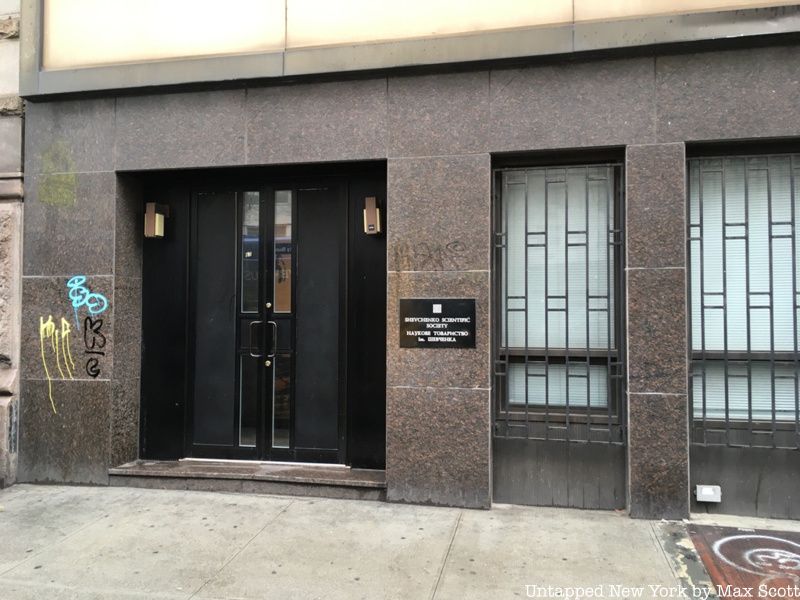
The Shevchenko Scientific Society, named after the infamous Ukrainian poet Taras Shevchenko, is a Ukrainian scholars organization. Originally founded in 1873 in Lviv, the society has a branch here in NYC’s Ukrainian Village located at 63 4th Ave. The society was created to promote scholarly research, and while it originally began with solely Ukrainian literature, it soon expanded to three different core aspects: history-philosophical, philological, and mathematically-medical-natural scientific. The organization is still in full swing today, and they are currently working on publishing the third volume of Encyclopedia of the Ukrainian Diaspora. The society also has an ongoing fundraiser to support scholars, writers, and artists who have been detrimentally impacted by the war.
8. The Selfreliance Association of Ukrainian Americans
The Selfreliance Association of Ukrainian Americans is an organization created to keep Ukrainian Americans in touch with both their cultural heritage and the community they belong to. The organization was established in 1947 to assist the growing number of Ukrainian immigrants in New York City. The Association’s mission includes preserving and promoting awareness of Ukrainian culture and language, fostering a well-connected Ukrainian American community, and providing assistance to its members through social services. The Association has a Ukrainian library and hosts seminars and social gatherings to keep its members involved. Anyone with Ukrainian ancestry is eligible to become a member, and those curious can check out their website or visit them in person at 98 2nd Avenue.
9. St. George Ukrainian Catholic Church
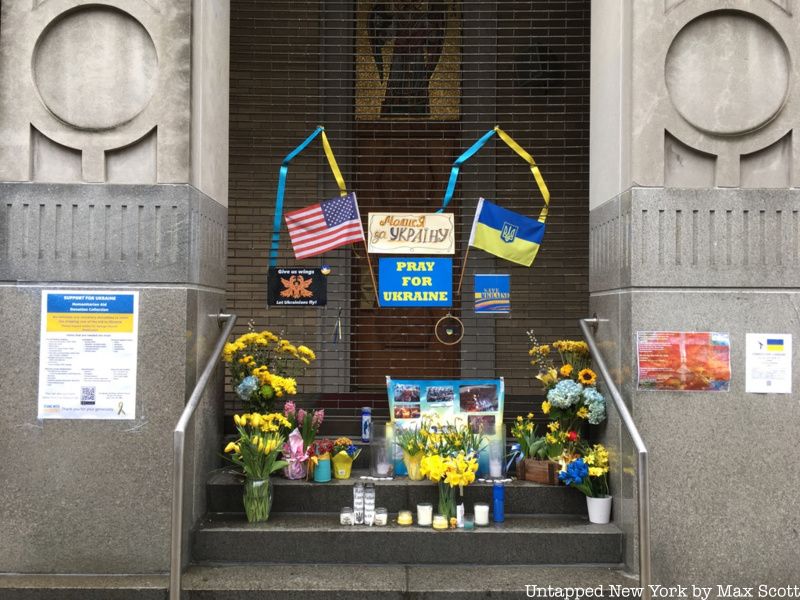
St. George Ukrainian Catholic Church is a Ukrainian Greek Catholic church located at 30 E 7th Street. While the original church was opened in 1905, the one currently standing today was built in 1978, and was designed by Ukrainian immigrant Apollinaire Osadca. The large onion dome was influenced beautifully by Ukrainian Byzantine architecture, and the facade serves as a tribute to the Ukrainian religion. As the war in Ukraine surges on, St. George Ukrainian Catholic Church accepts donations of urgently needed items that will be sent to Ukraine and given to those in need. All donations can be sent to the church’s address.
Gentrification of the Ukrainian Village
While these institutions and restaurants are still standing today, it is difficult to think of the Ukrainian Village and not remember its past eras. Once a hub of vibrant Ukrainian life and culture, the neighborhood has suffered in recent decades due to gentrified rent prices. These escalating rent prices affect not only the people who can or cannot afford to live in Little Ukraine but also which businesses can or cannot continue to serve the community.
Iconic Ukrainian shops and restaurants have been forced to close their doors and say goodbye to their nearly century-long homes. One of these was Odessa Restaurant, a classic 24-hour Ukrainian diner. The diner closed in 2020 for reasons including rent and the pandemic, following the closure of its bar and cafe just a few years before due to rent increases. The diner is still missed today and was a beloved spot by many in the East Village for late-night pierogi. Another tragic loss was the shop Surma. After 98 years in business selling Ukrainian books, clothing, and delicacies, the owners could sadly hold on to it no longer and had no choice but to close up shop in 2016.
While Little Ukraine may continue to get even more little as time passes, the community there knows its importance and plans to do its best to keep it from disappearing completely. In a New York Times article announcing the closure of Surma, local jewelry dealer Elena Solow said, “When neighborhoods lose their history they lose their souls, and all that’s left is the Gap.” Next time you find yourself in the Ukrainian Village, take a look around, poke your head in a shop, or maybe eat at one of the many amazing restaurants. Anything New Yorkers can do to keep the Ukrainian Village alive we should do. After all, it’s better than every closed shop turning into a Starbucks.
Next, check out our guide to Little Guyana and 20 Ethnic Enclaves in NYC!

